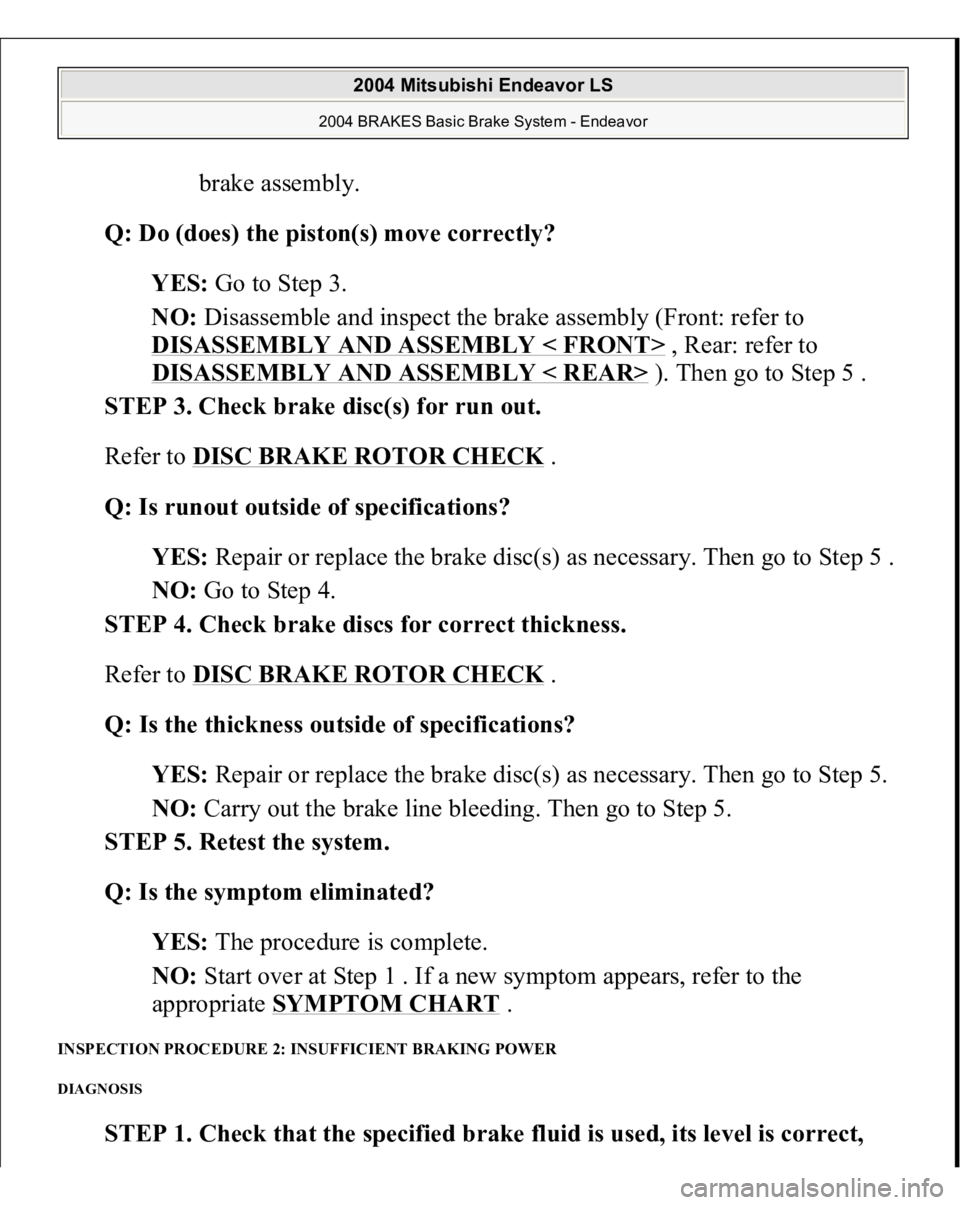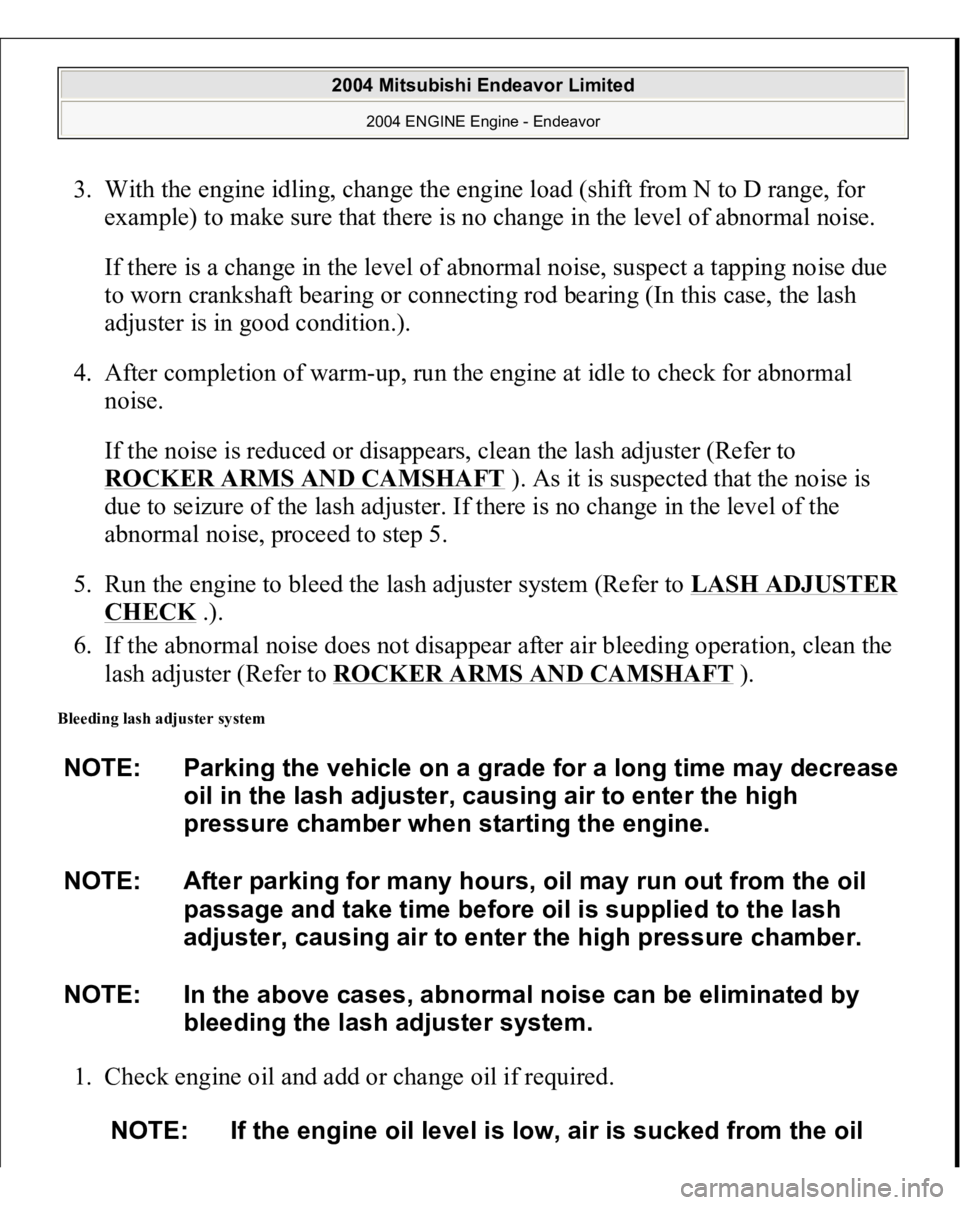Page 705 of 3870

brake assembly.
Q: Do (does) the piston(s) move correctly?
YES: Go to Step 3.
NO: Disassemble and inspect the brake assembly (Front: refer to
DISASSEMBLY AND ASSEMBLY < FRONT>
, Rear: refer to
DISASSEMBLY AND ASSEMBLY < REAR> ). Then go to Step 5 .
STEP 3. Check brake disc(s) for run out.
Refer to DISC BRAKE ROTOR CHECK
.
Q: Is runout outside of specifications?
YES: Repair or replace the brake disc(s) as necessary. Then go to Step 5 .
NO: Go to Step 4.
STEP 4. Check brake discs for correct thickness.
Refer to DISC BRAKE ROTOR CHECK .
Q: Is the thickness outside of specifications?
YES: Repair or replace the brake disc(s) as necessary. Then go to Step 5.
NO: Carry out the brake line bleeding. Then go to Step 5.
STEP 5. Retest the system.
Q: Is the symptom eliminated?
YES: The procedure is complete.
NO: Start over at Step 1 . If a new symptom appears, refer to the
appropriate SYMPTOM CHART
.
INSPECTION PROCEDURE 2: INSUFFICIENT BRAKING POWER DIAGNOSIS
STEP 1. Check that the specified brake fluid is used, its level is correct,
2004 Mitsubishi Endeavor LS
2004 BRAKES Basic Brake System - Endeavor
Page 741 of 3870
The master cylinder used has no check valve, so if bleeding is carried out by the
following procedure, bleeding of air from the brake pipeline will become easier.
(When brake fluid is not contained in the master cylinder).
1. Fill the reserve tank with brake fluid.
2. Keep the brake pedal depressed.
3. Have another person cover the master cylinder outlet with a finger.
Fig. 26: Identifying Master Cylinder Outlet
Courtesy of MITSUBISHI MOTOR SALES OF AMERICA.
2004 Mitsubishi Endeavor LS
2004 BRAKES Basic Brake System - Endeavor
Page 742 of 3870
4. With the outlet still closed, release the brake pedal.
5. Repeat steps 2 - 4 three or four times to fill the inside of the master cylinder
with brake fluid. BRAKE LINE BLEEDING Start the en
gine and bleed the air in the se
quence shown in the fi
gure.
2004 Mitsubishi Endeavor LS
2004 BRAKES Basic Brake System - Endeavor
Page 1532 of 3870

3. With the engine idling, change the engine load (shift from N to D range, for
example) to make sure that there is no change in the level of abnormal noise.
If there is a change in the level of abnormal noise, suspect a tapping noise due
to worn crankshaft bearing or connecting rod bearing (In this case, the lash
adjuster is in good condition.).
4. After completion of warm-up, run the engine at idle to check for abnormal
noise.
If the noise is reduced or disappears, clean the lash adjuster (Refer to
ROCKER ARMS AND CAMSHAFT
). As it is suspected that the noise is
due to seizure of the lash adjuster. If there is no change in the level of the
abnormal noise, proceed to step 5.
5. Run the engine to bleed the lash adjuster system (Refer to LASH ADJUSTER
CHECK
.).
6. If the abnormal noise does not disappear after air bleeding operation, clean the
lash adjuster (Refer to ROCKER ARMS AND CAMSHAFT
).
Bleeding lash adjuster system 1. Check engine oil and add or change oil if required. NOTE: Parkin
g the vehicle on a
grade for a lon
g time ma
y decrease
oil in the lash adjuster, causing air to enter the high
pressure chamber when starting the engine.
NOTE: After parking for many hours, oil may run out from the oil
passage and take time before oil is supplied to the lash
adjuster, causing air to enter the high pressure chamber.
NOTE: In the above cases, abnormal noise can be eliminated by
bleeding the lash adjuster system.
NOTE: If the engine oil level is low, air is sucked from the oil
2004 Mitsubishi Endeavor Limited
2004 ENGINE Engine - Endeavor
Page 1535 of 3870
abnormal noise after repeating the operation more than 30 times, suspect that
the abnormal noise is due to some other factors.)
Fig. 27: Air Bleeding Operation Pattern
Courtesy of MITSUBISHI MOTOR SALES OF AMERICA.
4. After elimination of abnormal noise, repeat the operation shown in left figure
five more times.
5. Run the engine at idle for one to three minutes to make sure that the abnormal
noise has been eliminated.
ENGINE ASSEMBLY REMOVAL AND INSTALLATION
CAUTION: *: indicates part which should be temporarily
tightened, and then fully tightened with the engine
2004 Mitsubishi Endeavor Limited
2004 ENGINE Engine - Endeavor
Page 2821 of 3870
YES: Go to Step 4.
NO: Bleed the air (Refer to POWER STEERING SYSTEM AIR BLEEDING
). Then go to Step 9 .
Fig. 4: Checking Fluid Level (Difficult Steering Wheel Operation)
Courtesy of MITSUBISHI MOTOR SALES OF AMERICA.
STEP 4. Check each hose for crushing or twisting.
Q: Is any hose crushed or twisted?
YES: Re
pair or re
place the hose. Then
go to Ste
p 9 .
2004 Mitsubishi Endeavor LS
2004 STEERING Power Steering - Endeavor
Page 2824 of 3870
STEP 1. Check the fluid level.
1. Park the vehicle on a flat, level surface, and then start the engine.
2. Turn the steering wheel several times to raise the temperature of the fluid
to approximately 50 - 60°C (122 - 140°F).
3. With the engine running, turn the wheel all the way to the left and right
several times.
4. Check the fluid in the oil reservoir for foaming or milkiness. Check the
difference of the fluid level when the engine is stopped, and while it is
running.
Q: Is the check result OK?
YES: Go to Step 2.
NO: Bleed the air (Refer to POWER STEERING SYSTEM AIR
BLEEDING
). Then
go to Ste
p 3.
2004 Mitsubishi Endeavor LS
2004 STEERING Power Steering - Endeavor
Page 2827 of 3870
STEP 1. Check the fluid level.
1. Park the vehicle on a flat, level surface, and then start the engine.
2. Turn the steering wheel several times to raise the temperature of the fluid
to approximately 50 - 60°C (122 - 140°F).
3. With the engine running, turn the wheel all the way to the left and right
several times.
4. Check the fluid in the oil reservoir for foaming or milkiness. Check the
difference of the fluid level when the engine is stopped, and while it is
running.
Q: Is the check result OK?
YES: Go to Step 2.
NO: Bleed the air (Refer to POWER STEERING SYSTEM AIR
BLEEDING
). Then
go to Ste
p 4 .
2004 Mitsubishi Endeavor LS
2004 STEERING Power Steering - Endeavor